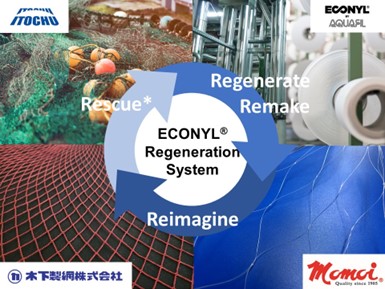Development of fishing nets using recycled nylon and establishment of a mass production system
March 5, 2024
ITOCHU Corporation (headquartered in Minato-ku, Tokyo; Keita Ishii, President and COO; hereinafter "ITOCHU") and Aquafil S.p.A. (headquartered in Italy; Giulio Bonazzi, CEO; hereinafter "Aquafil") have agreed to collaborate with fishing net manufacturing companies Momoi Fishing Net Mfg. Co., Ltd., (headquartered in 1576-5 Nakahiro, Ako City, Hyogo: Kazumitsu Momoi, President & CEO; heareinafter “Momoi”) and Kinoshita Fishing Net Mfg. Co., Ltd. (headquartered in 1 Harimakaito, Nishihazu-cho, Nishio, Aichi, Japan; Kotaro Kinoshita, President & CEO; hereinafter "Kinoshita "), two fishing net manufacturers, to develop and establish a mass production system.
Currently, approximately 1.15 million tons of plastic waste from the fishing industry, such as waste fishing nets and fishing lines, are lost into the ocean each year without proper disposal (*1). Under these circumstances, the development of environmentally friendly products and efforts to recycle marine waste are becoming important in order to realize a sustainable marine environment. ITOCHU made capital participation in Aquafil in March 2022(*2) and has been working with Aquafil to collect nylon waste including used fishing nets, promote ECONYL® ingredient, and develop end products.
Collected nylon waste is recycled into ECONYL® caprolactam, a raw material for nylon, at Aquafil's plant, and then transformed into ECONYL® chips and yarns. Today ECONYL®, is used by more than 2,500 brand owners worldwide, including those in the fashion and automobile industries. Fishing nets, on the other hand, have been difficult to commercialize due to issues such as strength and dyeability.
By combining Aquafil's developed ECONYL® ingredient, which has characteristics suitable for manufacturing fishing nets, with the net-making technologies of Momoi and Kinoshita, it was possible to succeeded in developing and establishing a mass production system for recycled nylon fishing nets that are not inferior in quality to petroleum-based nylon fishing nets. This will further advance the implementation of the nylon recycling scheme in society.
Recognizing the importance of the sustainable marine environment, ITOCHU has been engaged in the business of converting marine debris into products(*3)(*4). Going forward, ITOCHU will contribute to the creation of a sustainable, recycling-oriented society by promoting the use of environmentally friendly fishing nets and collecting used fishing nets through with partners.
-
*1Quoted from the Fisheries Agency, "Situation and Measures Concerning Marine Plastic Waste Problems in Fisheries.
- *2 ITOCHU Announces Capital Participation in Aquafil for Nylon Circulation Recycling|Press Releases|ITOCHU Corporation (itochu.co.jp)
- *3 Shopping baskets made from marine plastic waste were introduced at FamilyMart stores in Tsushima City, Nagasaki Prefecture and other cities|Press Releases|ITOCHU Corporation (itochu.co.jp)
- *4 Expanding the Use of Marine Plastic Waste as Raw Materials Supplying Raw Materials for the Stationery Industry's First Eco Mark Certified Products Made from Recycled Marine Plastic|Press Releases|ITOCHU Corporation (itochu.co.jp)
Image of the scheme for circulating waste nylon
|
|
- *ECONYL® is made of a variety of nylon 6 waste, not only fishing nets. ITOCHU collects waste fishing nets as well as PIR yarn, and waste cast nylon.
Momoi Netting Co.
| Location | 1576-5 Nakahiro, Ako, Hyogo, Japan |
|---|---|
| Representative | Kazumitsu Momoi |
| Establishment | September 1935 |
| Business | Manufacture, processing, sales, import and export of fishing materials, etc. |
| Website | https://www.momoi.co.jp/en/ |
Kinoshita Meshwork Co.
| Location | 1 Harimakaito, Nishihazu-cho, Nishio, Aichi, Japan |
|---|---|
| representative | Kotaro Kinoshita |
| Establishment | November 1948 |
| Business | Manufacture and sale of fishing nets and various nets for land use |
| Website | https://muketsu.co.jp/english/index.html |

